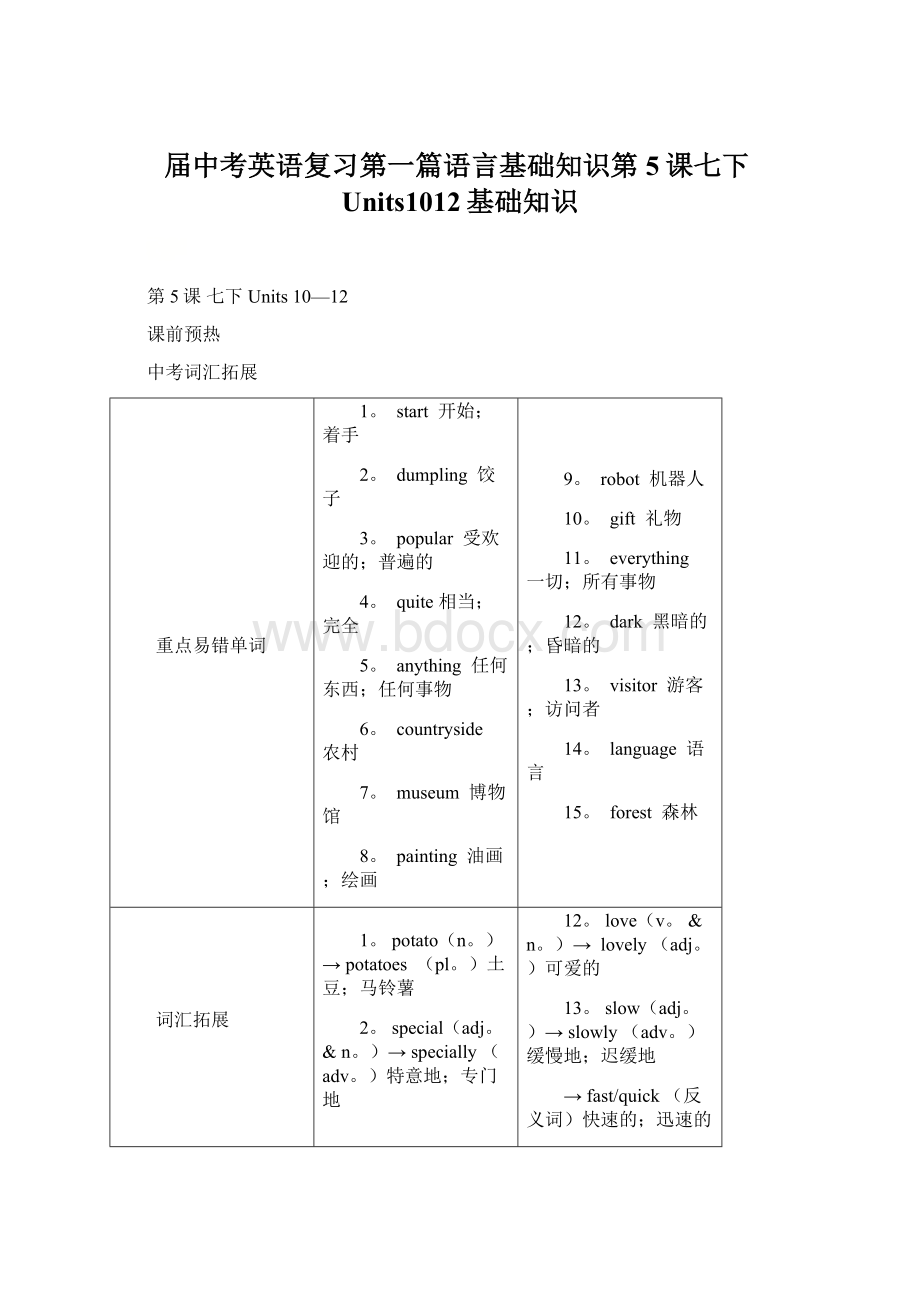届中考英语复习第一篇语言基础知识第5课七下Units1012基础知识.docx
《届中考英语复习第一篇语言基础知识第5课七下Units1012基础知识.docx》由会员分享,可在线阅读,更多相关《届中考英语复习第一篇语言基础知识第5课七下Units1012基础知识.docx(16页珍藏版)》请在冰豆网上搜索。

届中考英语复习第一篇语言基础知识第5课七下Units1012基础知识
第5课七下Units10—12
课前预热
中考词汇拓展
重点易错单词
1。
start开始;着手
2。
dumpling饺子
3。
popular受欢迎的;普遍的
4。
quite相当;完全
5。
anything任何东西;任何事物
6。
countryside农村
7。
museum博物馆
8。
painting油画;绘画
9。
robot机器人
10。
gift礼物
11。
everything一切;所有事物
12。
dark黑暗的;昏暗的
13。
visitor游客;访问者
14。
language语言
15。
forest森林
词汇拓展
1。
potato(n。
)→potatoes(pl。
)土豆;马铃薯
2。
special(adj。
&n。
)→specially(adv。
)特意地;专门地
3。
different(adj。
)→difference(n。
)不同;差异;区别
→differently(adv。
)不同地;有区别地
→same(反义词)相同的
4。
end(n。
)→ending(n。
)结尾
→endless(adj。
)无尽的
5。
luck(n。
)→lucky(adj。
)幸运的
→luckily(adv。
)幸运地
→unlucky(反义词)不幸的
6。
feed(v。
)→fed(过去式/过去分词)喂养;饲养
7。
farm(n。
)→farmer(n。
)农夫;农场主
8。
grow(v。
)→grew(过去式)
→grown(过去分词)生长;成长
9。
worry(v。
)→worried(adj。
)烦恼的;焦虑的
10。
paint(v。
)→painted(过去式/过去分词)画画;绘画
→painter(n。
)画家
→painting(n。
)油画;绘画
11。
excite(v。
)→excited(adj。
)感到激动的;感到兴奋的
→exciting(adj。
)使人兴奋的;令人激动的
12。
love(v。
&n。
)→lovely(adj。
)可爱的
13。
slow(adj。
)→slowly(adv。
)缓慢地;迟缓地
→fast/quick(反义词)快速的;迅速的
14。
hear(v。
)→heard(过去式/过去分词)听到;听见
15。
sheep(n。
)→sheep(pl。
)羊;绵羊
16。
nature(n。
)→natural(adj。
)自然的
→naturally(adv。
)顺理成章地;自然地
17。
visit(v。
)→visitor(n。
)访问者;参观者;游客
18。
tire(v。
)→tired(adj。
)疲倦的;疲劳的;累的
→tiring(adj。
)令人疲倦的
19。
mouse(n。
)→mice(pl。
)老鼠
20。
baby(n。
)→babies(pl。
)宝宝;宝贝
21。
fly(v。
)→flew(过去式)
→flown(过去分词)飞
22。
surprise(n。
&v。
)→surprised(adj。
)感到惊讶的
→surprising(adj。
)使人惊讶的
23。
wake(v。
)→waked/woke(过去式)
→waked/woken(过去分词)弄醒;醒
→awake(adj。
)醒着的
24。
India(n。
)→Indian(adj。
)印度的;印度人的
→Indian(n。
)印度人
中考词组短语
词组
1。
alargebowlofbeefsoup一大碗牛肉汤
2。
onone’sbirthday在某人生日时
3。
takeone’sorder点菜
4。
thenumberof……的数量(表单数)
5。
milkacow给奶牛挤奶
6。
feedchickens喂鸡
7。
quitealot(of。
。
。
)许多(……)
8。
inthecountryside在乡下
9。
beinterestedin。
。
。
对……感兴趣
10。
showsb。
around。
。
。
带领某人参观……
11。
learnalotaboutfarming学到很多关于农业的知识
12。
gofishing去钓鱼
13。
goonaschooltrip参加学校郊游
14。
teachsb。
todosth。
教某人做某事
15。
campbythelake在湖边野营
16。
playbadminton打羽毛球
17。
onSaturdaymorning在周六上午
18。
stayuplate熬夜
19。
runaway跑开
20。
shoutat。
。
。
冲……大声叫嚷(离叫嚷物近)
21。
shoutto。
。
。
对……大声喊叫(离叫喊物远)
22。
putupourtents搭起我们的帐篷
23。
makeafiretokeepsb。
warm生火取暖
24。
lookoutof。
。
。
朝……外看
25。
letthemknowaboutthedanger让他们知道危险
26。
jumpupanddown跳上跳下
27。
wake。
。
。
up把……弄醒
28。
learnausefullesson上了有益的一课
中考句型回顾
书面表达素材
1。
文化风俗
①Theyareasymboloflifeandgoodluck。
它们是生命和好运的象征。
②Thebirthdaypersonmustmakeawishandblowoutthecandles。
寿星必须许愿并吹灭蜡烛。
③InChina,it’sgettingpopulartohaveacakeonyourbirthday。
在中国,生日时吃蛋糕正变得流行。
④Theynevercutupthenoodlesbecausethelongnoodlesareasymboloflonglife。
他们从不切断面条,因为长面条是长寿的象征。
⑤Theybringgoodlucktothebirthdayperson。
他们给寿星带来好运。
2。
郊游与周末记事
①Allinall,itwasanexcitingday。
总之,这是令人兴奋的一天。
②Theroomswerereallydarkanditwasdifficulttotakephotos,soIdidn’ttakeany。
房间很黑很暗,并且很难拍照,因此我没有拍。
③Ididn’tlikethetripatall。
我一点都不喜欢这次旅行。
④Itwasgood,butI’mkindoftirednow。
挺好的,但我现在有点累。
⑤ButIwassotiredthatIwenttosleepearly。
但是我太累了以至于早早睡了。
⑥Wevisitedthesciencemuseumanditwasreallyinteresting。
我们参观了科学博物馆,它真的非常有趣。
语法精萃
Mybrotherdidn’trideahorseonthefarmyesterday,hemilkedacowinstead。
我弟弟昨天没在农场骑马,他去挤奶了。
(一般过去式)
情景交际
①—Whatkindofnoodleswouldyoulike?
你想要什么面条?
—I’dlikebeefandtomatonoodles。
我要牛肉西红柿面。
②—Whatsizewouldhelike?
他要多大碗的?
—He’dlikealargebowl。
他想要大碗的。
③—Whatdidyoursisterdolastweekend?
你妹妹上周末做了什么?
—Shewentboating。
她去划船了。
课堂突破
中考重点单词与短语
一、as的用法
【例句展示】
1。
Wehaveajobforyouasawaiter。
我们有一个服务员的工作给你。
2。
LiuYingisnotasgoodatsportsashersister。
刘英不像她姐姐/妹妹那样擅长运动。
3。
MyfriendwearsthesameclothesasIdo。
我的朋友穿着跟我同样的衣服。
4。
Hismotherlookedafterhimaswellasshecould。
他的妈妈尽她所能地照顾好他。
【精讲辨析】
1。
as作介词,意为“作为”。
2。
as意为“同样;一样”,常用于以下词组:
as。
。
。
as意为“与……一样”,中间加形容词或副词的原级;notas/so。
。
。
as意为“与……不一样;不及……好”。
在这些词组中,前一个as作副词,后一个as作连词。
3。
as作连词,还意为“像……一样;由于”。
相关短语:
assoonas一……就……;asusual像平常一样;regard。
。
。
as把……看作;as。
。
。
aspossible=as。
。
。
assb。
can尽可能地;thesameas与……一样;asaresult因此。
【活学活用】
根据汉语提示完成句子。
1。
Weregardourscienceteacher(作为)ourfriend。
Weliketotalkwithhimwhenweareintrouble。
2。
Nowourhomeworkisnot(与……一样多)before。
3。
(像平常一样),thechildwenttoschool。
4。
Youshouldwatertheplantsoftenas
(尽可能地)insummer。
二、cutup的用法
【例句展示】
Theynevercutupthenoodlesbecausethelongnoodlesareasymboloflonglife。
他们从来不切断面条,因为长长的面条是长寿的象征。
【精讲辨析】
cutup是“动词+副词”结构,意为“切碎”,相当于cutintopieces。
类似短语有:
useup用完;cleanup清理干净;eatup吃光;giveup放弃;turnup(音量)调高等。
注:
若代词作宾语则必须放两词中间。
【活学活用】
根据汉语提示完成句子。
Here’resomepears。
Please(把它们切碎)。
三、it的用法
【例句展示】
1。
Itis5kilometersaway。
有5公里远。
2。
—What’sthis?
这是什么?
—It’sanapple。
这是一个苹果。
3。
It’sverycoldtoday。
今天天气很冷。
4。
It’s5:
00。
五点了。
5。
—Whoisknockingonthedoor?
谁在敲门?
—Ithinkit’sJim。
我想是吉姆。
6。
It’snotagoodideaforstudentstocopyothers’
homework。
对学生来说,抄别人的作业不是一个好主意。
7。
Shefindsitmuchbettertodoherownwork。
她发现自己做作业要好得多。
8。
ItwasawatchthatIreceivedonmytenthbirthday。
我十岁生日那天收到的是一块手表。
【精讲辨析】
1。
it作实词,表达以下概念:
①指代前文提到的事物;②指代前文中的this,that;③指代一位性别不明的小孩或未知的人;④指代未指明但谈话双方都知道的那件事;⑤指代时间、天气、气候、距离等自然现象。
2。
it作形式主语或形式宾语。
【活学活用】
用适当的词填空。
1。
—Howoldisthebaby?
—isabouteightmonthsold。
2。
waswetalldayyesterday。
3。
Shefoundeasytofinishalltheexercises。
4。
ItwasadictionaryIfoundontheplaygroundyesterday。
中考重点句型
一、I’dlikeasmallbowlofnoodles。
我要一份小碗的面条。
【例句展示】
1。
I’dlikesomeapples。
我要一些苹果。
2。
He’dliketogowithyou。
他愿意和你一起去。
3。
I’dlikeyoutostaywithme。
我想你跟我待在一起。
4。
—Wouldyoulikesomecoffee?
你要来点咖啡吗?
—Yes,please。
是的。
【归纳提高】
wouldlike意为“想要;愿意”,相当于want。
但wouldlike常用于口语,语气委婉。
would常缩写为’d(Iwould=I’d;hewould=he’d等)。
相关短语:
wouldlikesth。
想要某物;
wouldliketodosth。
想要做某事;
wouldlikesb。
todosth。
希望/想要某人做某事。
一般疑问句式及其回答:
Wouldyoulikesome。
。
。
?
的肯定回答为Yes,please。
;否定回答为No,thanks。
。
Wouldyoulike/loveto(do)。
。
。
?
的肯定回答一般为Yes,I’dlike/loveto。
;也可用Yes,please。
/Allright。
/Yes。
/OK。
等;否定回答一般为I’dlike/loveto,but。
。
。
;I’mafraidnot。
等。
【活学活用】
A)句型转换。
1。
—Wouldyouliketotakeavacationwithusnextsummer?
(作肯定回答)
—,。
2。
—Wouldyoulikemorenoodles?
(作否定回答)
—,。
I’mfull。
B)用所给词的适当形式填空。
3。
He’dlike(go)campingwithus。
二、—Whatdidyoudolastweekend?
你上周末做了什么?
—Ivisitedmyuncle。
我看望了我的叔叔。
【例句展示】
Didyougotothezoo?
你去动物园了吗?
【归纳提高】
一般过去时指在过去的某个时间里发生的动作或过去某个时间存在的状态,常与表示过去的时间状语连用。
该时态在句中的体现为谓语动词的过去式。
有些不规则动词的过去式与原形相同,要注意区分。
当句中动词为行为动词时,要借助did构成一般疑问句和否定句。
但注意此时动词的过去式要还原成动词原形。
【活学活用】
用所给词的适当形式填空。
1。
Tony(play)footballeveryweekendwhenhewasyoung。
2。
Heputonhiscoatand(go)out。
中考词语辨析
一、cheap,expensive,high与low
【例句展示】
1。
Thisclothdollisverycheap。
这只布娃娃很便宜。
2。
Thiswatchisexpensive。
这块表很贵。
3。
Thepriceofthiswatchistoohigh。
这块表的价格太高了。
4。
Thepriceofthisbookisnotlowforme。
这本书的价格对我来说不低。
【辨异突破】
expensive与high涉及到价格“高”,而cheap与low涉及到价格“低”。
expensive与cheap是一组反义词,其主语必须是货物、物品本身,不能是价格。
high与low是一组反义词,其主语是价格,不能是物品本身。
注:
询问价格的句型:
Howmuchis/are。
。
。
?
=Whatisthepriceof。
。
。
?
【活学活用】
根据汉语意思翻译句子。
1。
这家超市的东西不贵。
Thethingsinthesupermarketarenot。
2。
对他来说这房子的价格太高,买不起。
Thepriceofthishouseistooforhimtoafford。
二、some与any
【例句展示】
1。
Wegotsomepresents。
我们得到了一些礼物。
2。
Theygaveussomecandies。
他们给了我们一些糖果。
3。
Doyouhaveanyping-pongballs?
你有一些乒乓球吗?
4。
I’mthirsty,couldIgetsomewater?
我渴了,我可以喝些水吗?
5。
Youcancallmeanytime。
你任何时候都可以打电话给我。
【辨异突破】
some和any意为“一些”,既可修饰可数名词,也可修饰不可数名词。
some常用于肯定句中;any常用于否定句和疑问句,有时用于条件句和肯定句中,意为“任一”。
但是当用来征询对方意见,并期望得到肯定回答时,some也可以用在疑问句中。
【活学活用】
用some或any填空。
1。
Wehavebooksonhistory。
ButIdon’thavebooksonscience。
2。
—Wouldyoulikemorecakes?
—No,thanks。
I’mfull。
3。
Ifyouwanthelp,pleasecallme。
4。
—Couldyoupleasegetmecoffee?
—Sure。
三、anumberof与thenumberof
【例句展示】
1。
Anumberofapplesarered。
许多苹果是红色的。
2。
Thenumberofstudentsis2,000。
学生的数量是2000。
【辨异突破】
1。
anumberof意为“许多;大量”,相当于alotof。
后接名词复数,谓语动词用复数。
2。
thenumberof意为“……的数量”。
后接名词复数,谓语动词用单数。
【活学活用】
用be动词的适当形式填空。
—Whatthenumberofthestudentsinyourschool?
—Abouttwothousand。
AnumberofthemfromEngland。
四、muchtoo,toomuch与toomany
【例句展示】
1。
It’smuchtoohot。
天太热。
2。
Thereistoomuchwateronthefloor。
地板上有太多水。
3。
Someoldpeoplethinkthelittlekidsgettoomanygifts。
一些老人认为小孩子们得到的礼物太多了。
【辨异突破】
1。
muchtoo意为“太……”。
much是用来加强too的,后接形容词或副词。
2。
toomuch意为“太多的……”。
too是用来加强much的,后接不可数名词;toomuch也可作状语,修饰动词。
3。
toomany后接可数名词复数形式,意为“太多”。
【活学活用】
用muchtoo,toomuch或toomany填空。
1。
Theyoungmandrovefast。
It’sdangerous。
2。
Playingcomputergamesisbadforyoureyes。
3。
Therearepeopleintheroom。
4。
Yougavehimmoneyforthetrip。
五、surprise,surprised与surprising
【例句展示】
1。
Iwassurprisedatthenewsabouthisdeath。
他去世的消息令我感到震惊。
2。
Wemeanttogiveyouasurprise。
我们本打算给你一个惊喜的。
3。
Iamsurprisedtoseehim。
看见他我很惊讶。
4。
Thesurprisingthingwastohearsomanyanimalsareindanger。
令人惊讶的事情是听到如此多的动物濒临灭绝。
【辨异突破】
1。
surprised作形容词,意为“感到惊讶的”,描述人的情绪或状态。
2。
surprising作形容词,意为“令人惊讶的”,描述事或物。
3。
surprise作名词,意为“惊讶”,toone’ssurprise意为“令某人惊讶的是”(一般作插入语,放在句首,用逗号隔开);insurprise意为“惊讶地”,表示方式或态度。
4。
surprise还可作动词,意为“使……惊讶”。
【活学活用】
用surprise的适当形式填空。
1。
Toour,hefailedinthetest。
2。
Wearetoheartheresult。
3。
Youcertainlyalltheguestsattheparty。
当堂检测
一、用方框中所给词的适当形式填空,每词限用一次。
visitlucksomethingcleancamp
1。
Idon’thavenewtotellyou。
2。
Wewentlastsummervacation。
3。
—WhatdidJimdo?
—Hehisroom。
4。
hewasnotbadlyhurt。
5。
LotsofcometovisitShaoxingeveryday。
二、根据短文内容和所给汉语提示,在空白处写出单词的正确形式。
每空限填一词。
MyfriendLisafromAustralia